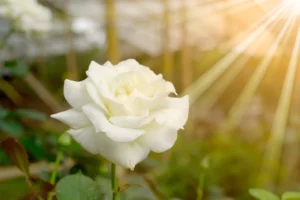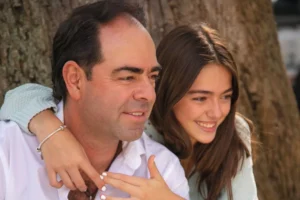I made the hair appointment with the same trepidation I felt when I pulled out my phone to show my stylist what I wanted. The picture? A woman with hair several inches shorter than my conservative chin-length bob.
For years, I had oogled over photos of pixie cuts on Pinterest. I kept saying to myself, however, that a short haircut like that would make my face look fat and ugly, take away from my femininity and cause me to look like someone I’m not.
As I turned those worries over in my head, they actually became the motivation. I’d been told for years that beauty and identity as a woman made in God’s image are about more than my appearance. But my fear of cutting my hair told me those truths hadn’t completely sunk in.
Finally last summer, I did it. With shaking hands, I showed my stylist what I wanted and told her to cut off (almost) all of my hair. Here’s what I’ve learned through the experience.
I realized my flawed definition of beauty.
As women, we’re given a script about what it means to be beautiful. Sometimes it’s explicitly stated, and other times it’s simply implied when you look around and realize many people look the same.
For the past few years, I’ve been frustrated when comparing my not-straight-but-not-wavy hair to ladies on Instagram with gorgeous, full locks. I spent money and time trying to learn the right curling technique or perfect a simple up-do. All the while, I kept pinning cute pixie cuts to Pinterest wondering if I’d ever have the courage to cut my hair. Honestly, I was afraid to go against a cultural beauty norm. I was afraid that whatever beauty I had in the eyes of culture would disappear with my hair. I was afraid I’d see myself as ugly.
And friends, that’s bad theology.
Though there are many descriptions and prescriptions in the Bible about beauty and women, two things stand out to me: My beauty has a lot to do with the state of my heart, soul and mind (and the fact that I am a fearfully and wonderfully made female image-bearer of God). These are truths my parents and Christian community taught since I was a child, and though I genuinely believed them, I still feared my physical beauty would vanish if I shortened my hair.
Our physical beauty and our internal beauty are mysteriously interconnected. A woman or man may be physically attractive by society’s standards yet lack the desirability that comes with cultivating a beautiful soul. Likewise, someone may not measure up to cultural definition of physical beauty, yet as we come to see his or her soul and how God’s handiwork is displayed, his or her beauty is fully displayed.
Last week, Val wrote that “part of redefining femininity has meant creating space for a diverse array of characteristics to manifest in women.” And I think the same should be said of beauty. We need to make space for diversity in what we consider beautiful in our appearance. Our brothers and sisters aren’t served nor do we celebrate the diversity of God’s creation when we narrowly define beauty.
Cutting my hair was an act of shunning the world’s standards for beauty and embracing how God made me. As I shed my locks, I began to let go of the belief that I needed my hair to look a certain way to be deemed beautiful.
I learned about creativity.
From the early chapters of Genesis, we learn that how we adorn ourselves matters. Adam and Eve covered themselves with fig leaves out of shame. Then God clothed them in garments of fur to cover that shame.
Moreover, clothing and style are products of our culture; they are a way which we carry out the command to subdue the earth for the glory of God. Like those who wore sackcloth and ashes in times of mourning and the priests who donned particular robes and ephods, we communicate through our personal clothing and appearance.
Who has God uniquely made me and how can I express that in my appearance? That’s the question I asked myself, and one of the results was cutting my hair.
Moreover, we image God through our creativity as we craft and put together our appearance in a way that bring joy and pleasure. Like eating, clothing and caring for our bodies isn’t simply something we do just to survive; it’s an activity we can delight and find pleasure in.
Chopping off my hair was a foray into creativity: Through cutting my hair, I decided to stop merely imitating what I saw all around me and start exploring how God has made me unique. God made me as a woman who likes my hair short. And frankly, having short hair has been fun. I’m not an artistic person, but through using my hair and wardrobe as a canvas, I’ve come to see the delight to be had in taking things that don’t seem to go together and creating something beautiful and enjoyable. Though it sounds trivial, the process has given me the tiniest insight into the joy God takes in creating.
I came to appreciate how God made me (and you).
When I shed my hair, I was exposing the part of myself I was most self-conscious about: my face. My hair was a security blanket of sorts. Something I didn’t necessarily like, but I needed it to feel safe and covered. I was afraid of what I’d discover without it.
Though my parents lovingly and faithfully assured me of my beauty, I grew up believing I wasn’t pretty. I never would’ve said I was ugly, but I knew I couldn’t measure up to the stars I saw on TV and in movies, or even the pretty girls with boyfriends at youth group. Without realizing it, I decided I would be the smart and spiritual girl and make peace with my average appearance.
Through shedding my hair, I came to appreciate who I am as a human being in a new way. I’m thankful for the glory of God’s handiwork in my appearance, even though I don’t meet conventional beauty standards. Attributing such a change to a haircut may sound a bit crazy, but our bodies matter. Letting go of a destructive insecurity propelled me into delighting in the goodness of God’s creation, displayed in my body.
As a result, I’m more ready to celebrate the beauty and diversity of the church as a whole instead of always feeling like other people are presenting a standard to compare myself to. Granted my first thought isn’t to immediately see the beauty. One of my besetting sins is pride, and that often manifests itself in a drive to be and have the best. I’m prone to consider how I measure up to other women physically because of my innate desire to be feel more beautiful, valuable and lovable. When I cut my hair, I lost my ability to compare my hair to others since there were so few people to compare with. And as my instinct to compare my hair with others began to fade, I had new eyes to see the beauty and diversity of hair all around me. I uncovered the freedom to be had in celebrating our differences in body, hair, face, etc. instead of constantly comparing.
What will beauty look like for you?
I don’t think you should schedule a hair appointment to get a pixie cut. I certainly don’t want to trade one set of standards for another. But I do want you to think about the assumptions that undergird your choices in the pursuit of beauty.
Do you watch countless YouTube videos to learn how to perfectly apply the latest makeup trend because you’re ashamed of a certain feature? Have you embraced a particular wardrobe simply because it’s cool to do and you want others to notice you? Do you feel like you just need to lose five more pounds to meet an “acceptable” weight?
There’s nothing wrong with wearing what’s trendy and popular. But make sure that how you think about beauty and express your own beauty isn’t solely dictated by culture. Consider what it means for you, as a unique image bearer of God, to creatively express your personhood and take joy in it.
And if that means cutting off all your hair, go for it.
Copyright 2016 Abigail Murrish. All rights reserved.











